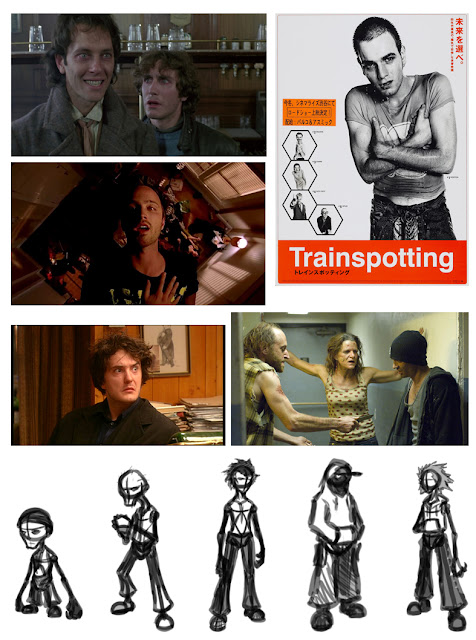When conceptualizing the character, I knew I wanted him to be agile and to have a very clear distinction between his organic and mechanical parts. To compliment the more streamlined shape of the cybernetics, the character would have mutations that were both odd in colour and varied in shape, almost like trails of smoke and flame made from the characters skin. This also led to the idea of giving the character fire powers or fire based abilities.
Of the sketch I lined up, Sketches B, F, J and L seemed the most interesting and made the most sense from an anatomical perspective. They all have a very agile look to them and both their clothing and mutations would complement their movements, which would be important in an action game. F looked like the best choice since it more resembles a humanoid despite its augmentations and would be able to fill the role of a playable character.
To better draw in the details on the
coloured character, I created the 3 Perspective View image first, to serve as
an accurate guide for the character. It also let me adjust the characters
proportions, simplify some details and determine which parts would have to be
modelled or simply be left as textures.
For colour, since the character's
mutations closely resemble fire, I gave them a red, burnt colouration, which
could be further built upon in modelling, by adding a texture reminiscent of
burns or burnt skin. This also lead to part of his clothing also being red, to
give the look a certain flow along one side of his body. The characters armour
also needed to be clearly mechanical, so it uses a lot of silver and black
colours, as well as a dark saturated green. These parts also feature a
hexagonal pattern, particularly on his shoulders and chest, both of which could
be applied in the texture phase. The characters skin also had to have a clear
distinction between its mutated parts and the cybernetic additions, so it's a
notably sickly pale colour and any parts leading into mutation would be
bordered by black veins on his skin.
Initially I used a cube to construct
the body but during this, I realised that I was having to subdivide the mesh so
much that the polycount would be far too high for this point in the project.
Also, this method made modelling the head very difficult since I couldn't
accurately adjust it, again due to the unnecessary faces and vertices.
For the second attempt, I used a
more traditional figure modelling method, using cylinders as a base and
constructing the features of the face separately from the rest of the head. Since
the character has asymmetric components to his design, the symmetrical elements
took priority. This also extended to parts of his body such as his feet. These
were modelled as separate meshes and attached rather than simply extruding them
from the rest of legs. This also helped create more even meshes for parts such
as the shoulder plates and the armour on his right arm.
The legs also needed some
consideration, since they had to be designed for an additional point of
articulation. This was resolved by simply looking at some reference of 3D
models of Raptors or other creatures with similar legs.
The cloth
strips on the back of his belt were made from a single flat plane.

















































